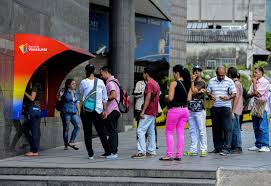Venezuelan Bondholders Are Preparing for a Fight if the Country Defaults on its $60 Billion Debt

Holders of Venezuelan bonds are meeting with each other and considering forming committees, advisers and fund managers told Reuters, as questions mount about the feasibility of President Nicolas Maduro’s proposal to restructure $ 60 billion of debt.
Maduro has said the country will keep servicing its obligations for now. But bondholders ranging from longstanding investment funds to hedge funds and emerging markets funds in the United States and elsewhere are starting to lay the foundations for a potentially bitter and messy battle over a possible default down the road.
A UK-based hedge fund, MacroSynergy Partners, has invited institutional holders of Venezuelan and state-owned oil company PDVSA debt to a Nov. 30 meeting in London to discuss the likely path forward and the next steps for creditors, according to an invitation seen by Reuters.
Participants will also discuss whether to create an informal, ad hoc bondholder committee, the invitation said.
While Venezuela has kept current on its bond payments, it has paid some coupons late, leading ratings agencies to declare a selective default and keeping creditors guessing. Another $ 237 million in interest payments were due on Tuesday but market sources said there was no sign of the funds hitting their accounts yet.
Venezuela failed to make those payments within the grace period, credit rating agency Standard & Poor’s said late on Tuesday, announcing it was downgrading the ratings on Venezuela’s global bonds due 2025 and 2026 to ‘D’ from ‘CC.’
In the United States, Millstein & Co’s head of sovereign advisory Mark Walker said he had met with an initial group of more than 20 creditors regarding the formation of a possible committee. He declined to name the creditors, citing confidentiality.
Bank industry group the Institute of International Finance has also been looking at forming a creditors’ committee, two sources familiar with the matter told Reuters.
It was unclear how many groups would ultimately form.
Creditors have also been organizing conference calls, and holding improvised meetings in Caracas hotels, investors have said.
For any restructuring to work, advisers and fund managers said two main conditions need to be met: the removal of U.S. sanctions on Venezuela that block U.S. banks from acquiring newly issued Venezuelan debt, and a commitment by Maduro to economic reforms.
Neither is likely to be met any time soon.
For more on Venezuela, watch Fortune’s video:
Many in Venezuela’s once-prosperous economy are suffering from food shortages and preventable disease against a backdrop of steep inflation triggered by years of government mismanagement. The government blames a fall in oil prices and a U.S.-led “economic war” for Venezuela’s financial mess.
“You can’t have a viable restructuring without a credible economic plan and a government with the commitment and competence to execute it,” said Walker, who advised on Greece’s restructuring while working at Lazard.
“If creditors are asked to take a hit now, they need to have reason to believe that they will be better off in the future,” he added.
But Maduro’s socialist government has consolidated power this year, creating a new rubber stamp constituent assembly, and has shown little interest in economic reform.
That lack of flexibility is likely if anything to lead to still tougher sanctions by the administration of U.S. President Donald Trump, who has described Maduro as a “bad leader who dreams of becoming a dictator.”
Venezuela’s Information Ministry and PDVSA did not respond to a request for comment.
Also key to any restructuring is the willingness of groups beyond the bondholders to spread the financial burden, advisers said.
Venezuela’s $ 60 billion in bonds is estimated to be only a third of the country’s total debt, with the rest in the hands of Russia and China.
Russia last week agreed a debt restructuring deal with Venezuela, while China voiced confidence in the government’s handling of the debt issue.
